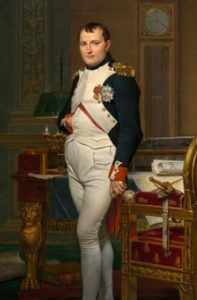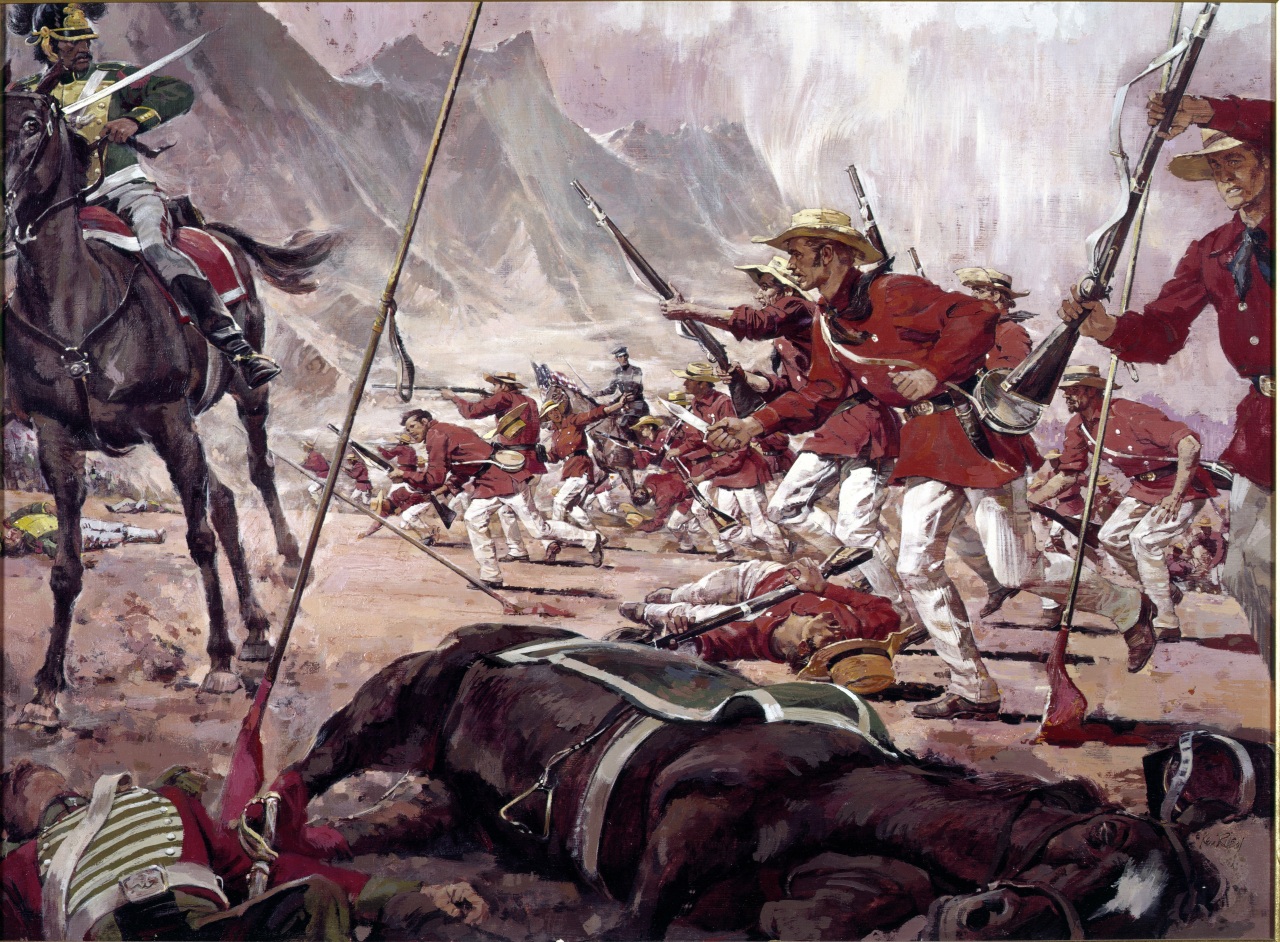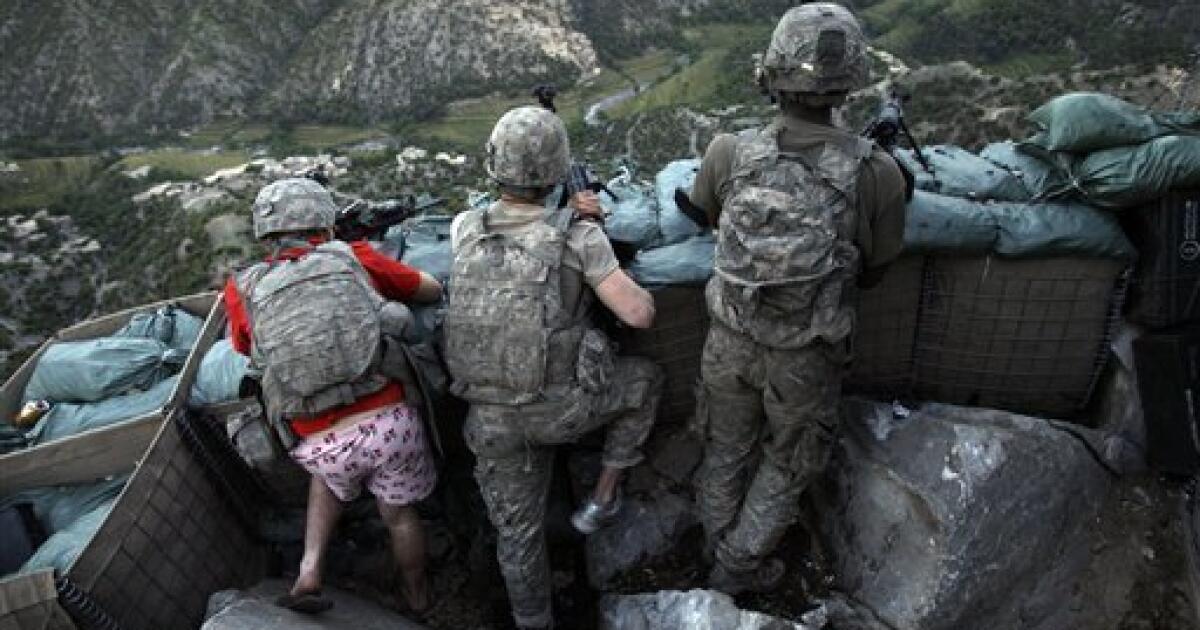Category: War
Hey its Texas, what did you expect!?! Grumpy
1918 – The Fall of Eagles | Dr John Bourne
Somethings never change
Another six months and it’d be a rifle and a speedo
Napoleon & His Marshals
Napoleon the Greatest?
My opinion, yes he is. I know others might say Julius Caesar or Alexander, but Napoleon fought across 3 continents in many climates against a variety of foes. He was engaged in at least 70 battles over his career, winning 59 of them, with only 11 battles resulting in a loss or draw. This means he was victorious 84% of the time. He also won many of his battles with inferior numbers to his enemy. This demonstrates he possessed superior tactical ability versus the generals of the opposing army. Napoleon was so successful, there was 10-year period from 1799 to 1809 where he didn’t losE a single battle. Indeed, most of his losses occurred during the end of his empire from 1812-1814 when he was low on troops and supplies.

Although he was a voracious reader of books and military history, he never really cared about what previous generals had done in similar battles. He went to a battlefield, did a few equations of probability in his head and knew where to position his troops and to attack the enemy troops.
But overall, I believe he remade warfare to achieve his goals. His maxims and strategies are still studied at military schools around the world to this very day. If you are still unsure if he was the greatest, here’s a list of opposing generals Napoleon defeated.
Mind you – all these men had a plan for victory, gave Napoleon their best shot……and lost. Argenteau, Provera, Beaulieu (defeated twice), Knorr, Wurmser (3 different times), Davidovich (twice), Alvintzy (twice), Wintzingerode, Murad Bey, Abdallah Bey, Mustafa Pasha, Melas, Mack, Kutuzov (twice), Hohenlohe, Kamensky, Benningsen, San Juan, Hiller, Konovnitsyn, de Tolly, Schwarzenberg, Wrede, Wittgenstein, Olsufiev, Sacken, Yorck, and lastly Blucher (5x) and Archduke Charles (6x).
Was he short?
This is a common myth, Napoleon was actually 5’7” or 5’6” which was about average for a Frenchman of the time. The British listed him as 5’2” and often depicted him as tiny in the press and cartoon caricatures. In addition, the British referred to him as “Little Boney” and even some French troops called him “le petit corporal”. But the latter statement was more of a term of endearment.
Early in the Italian campaign, General Bonaparte would usually site his cannon batteries – a job usually reserved for corporals. He also surrounded himself with his Imperial Guard at all times on the battlefield. The height requirement to be in this elite personal guard was 6’0”. The imperial guard uniform included a bearskin cap which was a little over a foot tall. So anyone would look smaller when standing next to a group of these hulking men.
Was Napoleon a Genius?
This is a tough question. My answer is I don’t know, although he was highly intelligent. In today’s society, only 1% of the population tests at the genius level on IQ tests. Quick sidebar – please ignore any IQ estimates of Napoleon that you might find on the internet. The first modern IQ test wasn’t developed until 1904, almost 90 years after Napoleon’s death. My opinion is that he was always the hardest-working person in any room. Growing up as he did, competing against his siblings first, and then his well-to-do military school classmates instilled an incredible work ethic within him.
He came to a France as a nobody from the small newly acquired territory of Corsica. He always wanted to be the man in charge and he was a risk taker. He could work without sleep for several days straight, sometimes sitting on horseback for 20 hours a day and even eating his meals there. He understood the military maxim, “get there the first-est with the most-est” as he hurriedly pressed his troops to march hundreds of miles to run circles around their opponents. But he also incurred many failures in life, he had a tumultuous first marriage with Josephine. His siblings were of constant displeasure to him.
His Imperial Navy efforts were disasters as was his Continental System economic plan. And despite all warnings from his subordinates, he initiated 2 invasions that would bring down his empire. Spain and Portugal in 1807 and Russia in 1812. After tremendous losses in both endeavors, he had many opportunities to make peace with the rest of Europe. He spurned those olive branches and this led to his eventual downfall. I believe that a battlefield was simple to him, much like music was to Beethoven or Mozart when they sat down at a piano.
What were the backgrounds of Napoleon’s marshals?
Napoleon’s “sacred few” marshals were from diverse backgrounds. Some were former nobles from King Louis XVI’s reign, while others were sons of commoners who worked their way up through the ranks. An attractive feature of the French army after the French Revolution was the opportunity to advance in rank based on merit. This was a radical idea at the time. In most pre-Revolution royal armies in Europe, officers were only allowed to come from nobility. The highest rank a commoner could achieve was a non-commissioned officer such as a sergeant or warrant officer.

Marshal Ney, Bravest of the Brave
Ney was the son of barrel-maker, Oudinot was the son of brewer. Lannes and Mortier were the sons of farmers. Bernadotte, Soult, Moncey, and Brune were sons of lawyers. Murat, possibly the most famous of all the marshals, was the son of an innkeeper. Only 5 of the 26 marshals originated from military families – Serurier, Davout, MacDonald, Marmont, and Victor.
There was an adage at the time that stated every soldier in Napoleon’s army carried a baton in his backpack, meaning that the highest rank was available to anyone who worked hard enough. I believe the marshals and the Grand Armee was successful because, for the first time, the soldiers were promoted on merit instead of privilege. When a rising officer was lobbied by Napoleon’s staff to become a general, Napoleon usually asked a simple question – is he lucky?
Sounds ridiculous but Napoleon really did believe in luck and he also believed that the harder you work, the luckier you are. He was fortunate to have a large assortment of lucky, hard-working generals.
What were the rewards and dangers of being a marshal?
The rank of marshal in France is highest honor a person can receive during war-time. Its tradition goes back to the 1200’s. During Napoleon’s reign, each marshal or the “Big Hats” as they were called by the rank and file, received a baton decorated in blue velvet and adorned with a Latin inscription that translates to “Terror in war, ornament in peace”. Each marshal also received financial endowments, estates, dukedoms and kingdoms from Napoleon. Berthier received the most cash, $1.2 million francs per year. Ney received an average of $1 million francs per year and Davout received the 3rd most with $910,000 francs per year.
The marshals were essentially viceroys for the Emperor. As much as he tried, Napoleon could not be everywhere at once. All marshals were expected to lead from the front and it was a dangerous position. Most of the marshals were wounded in battle, with Oudinot being the most frequent recipient with over 35 battle scars. All were amazingly fearless even for that era of honor and bravery. Only 4 of the 26 – Massena, Brune, Moncey, and Kellerman not wounded in battle at all. On the other hand, 3 of the marshals were killed as a result of wounds suffered in battle.
Were Napoleon’s Marshals effective without him?
This is another common myth that Napoleon’s troops were only effective when he was on the battlefield. After diving into and analyzing the battle numbers, this is a falsehood. For the purpose of this podcast, I analyzed the won-lost record of every battle fought by Napoleon’s army from 1793-1815. Winning a battle is hard thing to define, as even winning armies can take huge casualties. For our purposes, we will count winning as controlling the battlefield after the battle was over or the taking of a castle or fixed position after a siege is over. We will qualify losing a battle as retreating or losing control of a castle or fixed position.
When it comes to this metric, most of Napoleon’s marshals had a winning battle record on their own – meaning without Napoleon in the immediate area. Some had very impressive won-loss records like Lannes, Bernadotte, Murat, and Davout (of whom it was said never lost a battle). Others like Soult and MacDonald had more losses than victories, but were still trusted by Napoleon with important tasks and objectives.
A final point is the question of whether Napoleon would have been as successful without these brilliant men – arguably, the greatest collection of military talent in history. I can’t think of any other group of generals that have so much research about them. You don’t often find books about the generals of Alexander the Great, Charlemagne, Genghis Khan, or Frederick the Great. These generals were the celebrities of the age and they won battles with Napoleon and without Napoleon.


I bet a lot of folks don’t know that he was a West Pointer* too! Grumpy * Class of 1828
In my humble opinion, it took a huge amount of guts to go down the sea as a fighting man. What with unsanitary living space, so so food, savage discipline, the high chance of having a sadistic & maybe insane Captain.
Plus ships make for a huge target / lead magnet and if you get hurt or wounded its best to not think of what will happen to you. I will also not get into the issue of possible cannibalism if your ships sinks and you make it to a life boat.
So it all makes for me to say that I am so grateful to have been a soldier instead. Grumpy

